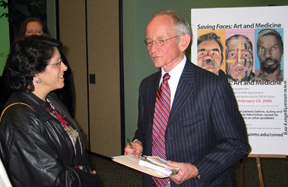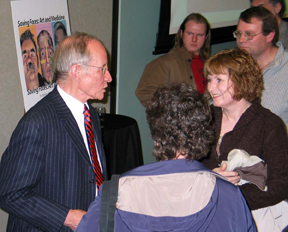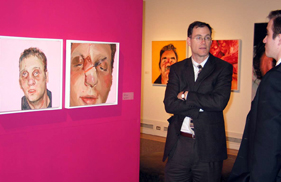 |
Ted Kooser talks with Magda Peck, Sc.D. |
The poet laureate of the United States and Pulitzer prize winner also is a survivor of head and neck cancer.
“Dr. (Bill) Lydiatt and UNMC saved my life,” Kooser recently told an audience of more than 500 who attended his talk on healing through poetry. “I managed to survive head and neck cancer and then all these wonderful things happened to me.”
Kooser’s Jan. 26 talk was part of a seminar series running in conjunction with the art exhibition “Saving Faces: Art and Medicine,” 42 portraits of patients by Scottish artist Mark Gilbert. The exhibit, which has toured Europe and goes next to Toronto, runs through Feb. 24 at the Weber Fine Arts Building at the University of Nebraska at Omaha.
Kooser said he put his own health on hold in late 1997 because his mother in Cedar Rapids, Iowa, was dying. “It was a stressful time,” he said.
As a result, a “persistent canker sore” – less than the size of a dime — on the back of his tongue went unchecked until June 1998. By that time, Bill Lydiatt, M.D., a head and neck cancer surgeon at UNMC, told Kooser he’d have to remove part of his tongue.
 |
Ted Kooser mingles with the crowd after his Jan. 26 presentation. |
“None that I couldn’t give up to get better,” Kooser said.
He does give poetry readings, his wife said.
Before his next appointment with Kooser, Dr. Lydiatt went to the public library and checked out several of his books including “Weather Central.”
“Anytime you get to know someone on a level beyond the waiting room it changes the interaction in the exam room,” said Dr. Lydiatt, admitting he didn’t particular like poetry, until he met Kooser. “In reading his poetry, I learned the way he thinks, the way he observes, his warmth and humor.”
In the fall of 1998, during his recovery from surgery and radiation for cancer, Kooser would rise each morning for a two-mile walk on the gravel roads near his Garland, Neb., home.
There, in the pre-dawn hours he rediscovered his ability to write. His poems changed, taking on new life and clarity. “Everything in life holds a marvelous interest when you think you might have died,” he said.
That burst of creative energy resulted in 130 poems – one written per day – that he taped on postcards and mailed to his friend Jim Harrison, author of “Legends of the Fall.” He later compiled them into a book titled, “Winter Morning Walks: One hundred postcards to Jim Harrison.”
“It’s the most important book I’ve ever written — to me — because it’s so intimately connected to this experience of getting better,” Kooser said. “Writing poetry is a way of establishing order in a very disorderly life. Nothing is more disorderly and chaotic than having cancer.”
Today, Kooser is basking in the spotlight as poet laureate, traveling the country promoting the art and publishing “American Life in Poetry,” a weekly newspaper column, which will continue beyond his tenure as poet laureate.
 |
Bill Lydiatt, M.D., left, talks about the Saving Faces portraits on display at the UNO Art Gallery. |
Still, his remarkable journey isn’t lost on the man who still prefers the solitude of his rural home over fame and fancy titles.
“If I had turned right instead of left, how my life would have been different,” Kooser said, noting how his book, “Local Wonders,” was among hundreds of books at the New York Book expo when the woman who selects the Barnes and Noble Discover Awards picked up his book. “There’s no way that could have been choreographed.”
There’s also no way of knowing how many non-poets he’s transformed. One man in the audience said, despite his protests, he joined his wife at the reading and found himself engaged by Kooser’s wit and poetry: “I’m delighted that you represent all of us,” he said.
Another woman, a cancer survivor, was moved by Kooser’s final poem in “Winter Morning Walks,” when he sees the sun waiting for him at the end of the road. “Sometimes I forget I ever had cancer,” she said. “Then, there’s a moment when you feel a chill and don’t know where it came from.the image you gave (of the sun) is what I will think about.”
Poetry should be pleasurable, Kooser said, “like taking a drive on Sunday.” The real pleasure is not in publishing a poem, he said, but in the process of seeing the words fall into place.
For Kooser, that’s part of life and part of healing.